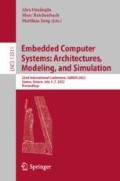Abstract
Multi-sensor embedded systems often consist of a central unit being responsible to manage a heterogeneous set of attached sensors. Particularly when such systems are deployed in areas without access to a static power supply, they have to be powered using energy harvesting to operate autonomously. Objectives such as availability and data loss rate depend on the set of attached sensors, the system configuration (e.g., used photovoltaic (PV) module, batteries, and data storage), as well as environmental factors such as the location of the deployed system. Moreover, also the employed energy management strategy and its parametrization severely influence the system characteristics. In fact, different strategies can lead to different tradeoffs in terms of the above objectives. In this paper we propose a design methodology to automatically explore the design space of configurations of multi-sensor embedded systems and to determine and configure the best energy management strategy for a given sensor configuration and location. Our methodology includes a real-time analysis and a simulation-based DSE to explore the design space. We investigate a case study from a biomonitoring project and demonstrate the benefits of the proposed design methodology: A system—including its configuration and energy management strategy—has to be tailored to the characteristics of the set of attached sensors and the location it operates. Else designs exhibit suboptimal characteristics when operating at sites or for sensor sets for which they were not optimized.
Access this chapter
Tax calculation will be finalised at checkout
Purchases are for personal use only
Notes
- 1.
When statically designing such systems (see Sect. 4), we can layout the system that \(d_{w}(t)\) is never higher than the storage’s maximum write rate.
- 2.
We give data writes higher priority to avoid data loss.
- 3.
- 4.
References
Birken, R., Zhang, J., Schirner, G.: System Level Design of a Roaming Multi-Modal Multi-Sensor System, chap. 23. Woodhead Publishing (2014)
Blickle, T., Teich, J., Thiele, L.: System-level synthesis using evolutionary algorithms. Des. Autom. Embedded Syst. 3(1), 23–58 (1998). https://doi.org/10.1023/A:1008899229802
Castagnetti, A., Pegatoquet, A., Belleudy, C., Auguin, M.: A framework for modeling and simulating energy harvesting WSN nodes with efficient power management policies. EURASIP J. Embedded Syst. 2012, 1–20 (2012)
Geissdoerfer, K., Jurdak, R., Kusy, B., Zimmerling, M.: Getting more out of energy-harvesting systems: energy management under time-varying utility with preact. In: IPSN, pp. 109–120 (2019)
Iovanovici, A., Topirceanu, A., Udrescu, M., Vladutiu, M.: Design space exploration for optimizing wireless sensor networks using social network analysis. In: ICSTCC, pp. 815–820. Sinaia, Romania, October 2014
Liu, Q., Mak, T., Zhang, T., Niu, X., Luk, W., Yakovlev, A.: Power-adaptive computing system design for solar-energy-powered embedded systems. IEEE VLSI 23(8), 1402–1414 (2015)
Lukasiewycz, M., Glaß, M., Reimann, F., Teich, J.: Opt4j: a modular framework for meta-heuristic optimization. GECCO 2011, New York, NY, USA, pp. 1723–1730. Association for Computing Machinery (2011). https://doi.org/10.1145/2001576.2001808
Migge, J., Jean-Marie, A., Navet, N.: Timing analysis of compound scheduling policies: application to posix1003.1b. J. Sched. 6(5), 457–482 (2003)
Moser, C., Chen, J.J., Thiele, L.: An energy management framework for energy harvesting embedded systems. J. Emerg. Technol. Comput. Syst. 6(2), 1–21 (2008)
Racu, R., Li, L., Henia, R., Hamann, A., Ernst, R.: Improved response time analysis of tasks scheduled under preemptive round-robin, pp. 179–184. ACM (2007). https://doi.org/10.1145/1289816.1289861
Shallari, I., Leal, I.S., Krug, S., Jantsch, A., O’Nils, M.: Design space exploration for an IoT node: trade-offs in processing and communication. IEEE Access 9, 65078–65090 (2021)
Tiwari, A., Ballal, P., Lewis, F.L.: Energy-efficient wireless sensor network design and implementation for condition-based maintenance. ACM Trans. Sen. Netw. 3(1), 1 (2007)
Wägele, W., et al.: Towards a multisensor station for automated biodiversity monitoring. Basic Appl. Ecol. 59, 105–138 (2022)
Zhao, Z., Barijough, K.M., Gerstlauer, A.: Network-level design space exploration of resource-constrained networks-of-systems. ACM Trans. Embed. Comput. Syst. 19(4), 1–26 (2020)
Zhou, J., Yan, J., Wei, T., Chen, M., Hu, X.S.: Energy-adaptive scheduling of imprecise computation tasks for QoS optimization in real-time MPSoC systems. In: DATE, pp. 1402–1407 (2017)
Acknowledgment
This work was supported by the German Federal Ministry of Education and Research (development of AMMODs).
Author information
Authors and Affiliations
Corresponding author
Editor information
Editors and Affiliations
Rights and permissions
Copyright information
© 2022 The Author(s), under exclusive license to Springer Nature Switzerland AG
About this paper
Cite this paper
Sixdenier, PL., Wildermann, S., Ziegler, D., Teich, J. (2022). SIDAM: A Design Space Exploration Framework for Multi-sensor Embedded Systems Powered by Energy Harvesting. In: Orailoglu, A., Reichenbach, M., Jung, M. (eds) Embedded Computer Systems: Architectures, Modeling, and Simulation. SAMOS 2022. Lecture Notes in Computer Science, vol 13511. Springer, Cham. https://doi.org/10.1007/978-3-031-15074-6_21
Download citation
DOI: https://doi.org/10.1007/978-3-031-15074-6_21
Published:
Publisher Name: Springer, Cham
Print ISBN: 978-3-031-15073-9
Online ISBN: 978-3-031-15074-6
eBook Packages: Computer ScienceComputer Science (R0)

